- Home
- William Maxwell
Ancestors: A Family History Page 2
Ancestors: A Family History Read online
Page 2
Once I asked my father what Max’s father was like, and he said, in the indirect way grown people answer children’s questions, that Bert liked the wrong kind of men. I interpreted this to mean that my aunt liked men who wore loud checks and spent their time at the racetracks, and it may well have been true. Since I was very fond of her, I would have excused an even greater lapse from good judgment. Two of the men who wanted to marry her, my father said, were, later on, very successful in business. If she’d married either one of them—but she wouldn’t have them. And he considered this a further evidence of her perversity. His own character was straightforward and uncompromising and cautious, and he tended to view human behavior in rather simple, old-fashioned (even for his period) terms; that is, he thought everybody was at all times able to distinguish between right and wrong, and when they got into trouble it was largely their own doing. Though he considered that his sister had mismanaged her life, he stood by her faithfully, offering financial help when it was needed, and I used to suspect him of taking a melancholy pleasure in the thoroughness with which she pulled the house down on her head. She named her only child for him, and when my father was in trouble she came running.
As a small child, Max Fuller was so beautiful that photographs of him, in a girl’s petticoat, with his bare legs crossed at the ankle and an expression of innocence on his exquisite androgynous face, were framed by the yard. There was a set in our upstairs hall, under the gas night-light, and my Aunt Maybel, my father’s older sister, had another. It was a period that admired sweetness above all other qualities in art.
How Max felt about those pictures may be deduced from the fact that, as a grown man, he parted his hair in the middle and plastered it flat to his head. Even so, he’d have looked like the Arrow collar ads that were everywhere at the time, except that he lacked the proper physical complacency.
From snapshots pasted in my Grandmother Maxwell’s scrapbook it appears that as a boy Max was properly clothed, that he had friends, male and female, that he was sent to a boys’ camp, that he played football, that he knew how to sit on a horse, that he was not afraid to dive from high places. Since there were no Socialists in the family, the corset factory in Chicago was not referred to as a sweat shop, but surely that’s what it was. Moving back one stage from the man who knew about putting sherry in turtle soup, I arrive at a nice-looking boy of seventeen, whose face was without any color and whose expression, especially about the eyes, reminded me of a nervous animal. Nothing that I ever heard about my Aunt Bert’s second husband would have led one to believe that he was a wicked man, but the ground on which my aunt obtained a divorce from him was “that the said defendant had been guilty of habitual drunkenness for the space of two successive years prior to the filing of this Bill of Complaint …” This cannot have been pleasant for my aunt, or for Max. His stepfather had a daughter by a previous marriage, who lived with them, and she and Max did not get on well. My aunt’s second marriage lasted about ten years, after which it was too late for Max to start over again on a different and better childhood.
The scrapbook contains a number of undated postcards and letters from him, including this:
Dearest Grandmother:
I received your nice letter and am trying to live to your desires and be a credit to the Maxwell family. I have plenty of confidence and know I will make good. Mother and I are happy now and wish you would come up and see us. I like my work fine and I still attend Sunday school. With lots of love to you,
Maxwell
Sixteen or seventeen, he must have been, for, clearly, there is no longer a man in the house. The happiness, like all happiness, was fragile. Later on, by her mournful way of speaking of him, and sometimes more explicitly, my Aunt Bert led people to think that Max did not love her. Or at least that he did not love her the way he should. At eleven years old I didn’t know enough about life to question it, though it was, of course, highly questionable and self-indulgent behavior. Who is to say how much Max loved his mother except Max? How much did she love him? He was not an unfeeling man, and it doesn’t make sense, any of it, except as an example of how a grave disappointment can be transferred from the real cause, about which one can do nothing, to some other, more sensitive area.
Before this happened, there was a change in the circumstances of her life. She had a run of good luck. Her natural flair with ribbons and laces and artificial flowers was recognized by the people she worked for. They put her in the designing department and then offered her a job taking orders from merchants in small towns around the state. She used our house as her headquarters because it was convenient and because my father needed her at that point. And for a short while she was very successful. But then the family doctor told her that she had to have her appendix removed, and in performing the operation he cut something he shouldn’t have. Or so my father said. With the result that my aunt could no longer carry heavy sample cases and had to retire from the road. It was too sudden and complete a reversal. It had meant so much to her to be out in the world, doing well, and making a good salary. During her convalescence she put on weight. And she did not feel at all well. For the first time in her life her body was a burden to her. But she had to do something. Through a business connection she got a job as a substitute teacher in a coal-mining town in southern Illinois. It was a stopgap. She did not want to live down there, and she wasn’t sure how long she would be physically able to go on dealing with unruly seventh-graders. One day a big box of hats arrived at our house from southern Illinois, every one of them fetching. And reasonably priced. Within twenty-four hours they were all sold. Another box arrived and went just as quickly. Before my aunt could send a third, my father got a letter from the secretary of the local Chamber of Commerce. Nate Landauer, the owner of a ladies’ ready-to-wear shop on the courthouse square, had complained that my father (who didn’t know one end of a lady’s hat from the other) was operating a millinery shop out of his house in Park Place. My father would have liked to tell them both to go to hell, but he didn’t. In some obscure way they had him. He wrote my Aunt Bert that she wasn’t to send any more hats.
This blow was one more proof, which she didn’t really need, that her luck had deserted her. But she still had Max. If she was forced by ill health to give up her job she could go and keep house for him. He didn’t even have a house at this time—he was an engineering student at the University of Cincinnati. But people do not go to school forever.
Max upset his mother’s plans by getting married, when he was only five months out of college, to a girl from a well-to-do family in Cincinnati. My aunt did not disapprove of his wife but of his marrying at all, when his first duty was to her. She saw this as something unarguable, a moral obligation he had failed to meet. The older generations would have unhesitatingly agreed with her, but hers was the last that was able to entertain such an idea. Max was a child of the twenties, and it was not a period that went in for ancestor worship. If I were to suggest to my own children that their first duty was to their mother or me, not to themselves, they would be astonished.
Max and his mother had a falling out, of a lasting kind. He continued to write to her, and from time to time she went to Cincinnati for a visit. Her daughter-in-law and her granddaughter figured in her conversation. But the awkwardness persisted.
If Max’s mother could not or would not abandon her grievance against him, there was somebody who was always waiting to receive him with open arms: my Aunt Maybel. He loved her also, for she had helped bring him up, and he didn’t hold it against her that she lived in the 19th century, not the 20th. During his boyhood, her house, where nobody ever came home drunk and knocked over the furniture, or for that matter even so much as drank a glass of beer on a hot night, was a haven of refuge his mind must often have dwelt on. She was totally unlike his mother physically and in every other way. She always did what she said she was going to do. And most of all she took him and all his concerns seriously.
She took everything seriously, including the so
lemn business of proving that she had a right to be a member of the D.A.R. And she managed to interest Max in genealogy. He was a lot brighter and better educated and more thorough than she was, and he went at it in a businesslike fashion, reading out-of-the-way books and carrying on a lively correspondence with county clerks. He and my Aunt Maybel wrote back and forth about whether the one who died in 1771 could have been a son of John, d. 1756, not the first James … Gibberish unless you put your mind to it quite firmly.
At no time in his life was my cousin as securely situated as I thought when I was having dinner with him. His marriage was happy, but even a happy marriage requires having your wits about you, and Max’s situation was not uncomplicated. The world he married into was socially a cut—several cuts—above the one he was born into. His father-in-law was the head of the Cincinnati traction system and a public figure. Max’s wife was ambitious for him and it was probably her influence that led him to give up engineering, a field in which advancement was likely to be slow, in favor of starting a brokerage business. My Aunt Maybel and my Grandmother Maxwell loaned him the money to open an office, and he did well enough but not spectacularly—I mean he wasn’t a millionaire at twenty-seven. At first they lived with his wife’s family, then on the second floor of a duplex; his wife had a miscarriage, which in turn produced an emotional crisis, and they ended up living with Max’s father-in-law as before. When their daughter was born, Max’s wife kept the baby in her room, and Max moved up to the attic. This arrangement must have lasted for quite some time, for Max’s daughter remembers her father coming down to the second floor in his bathrobe to shave. But eventually he asserted himself and they lived in their own house again.
Max’s father-in-law’s interest and affection were so centered on his own son, who did not turn out well, that he was not much aware of Max, who did. The relation was cordial but not close. I think of my relations with my father—of how consistently I resisted his opinions, from the age of fifteen, and at the same time believed that he offered the only possible model of decent behavior. And then I think of Max, of what it was like for Max with no father to ape or take issue with.
At the age I was then, I never asked personal questions, but I wish I had somehow given him a chance to say what it was that he hoped to gain for himself as he went about collecting facts having to do with births, deaths, and marriages of several generations of self-respecting, not very well-educated, for the most part devout men and women nobody has ever heard of.
The genealogy was never finished. Outlying branches of the family did not always take the trouble to answer Max’s letters. Or if they did, the facts they supplied him with were jumbled. Or mystifying. Or irrelevant. In order to get the information he needed, he’d have had to devote years of his life to poring over old records and church registers—years that it turned out he did not have. In his early forties he developed Buerger’s disease, which is defined in the medical dictionary as an inflammation of the innermost wall of a blood vessel, with a clot formation. It is a form of gangrene, and it occurs generally in the lower arteries and veins of the leg. It is an allergy, related to chain-smoking. My gentle, kind cousin stoically endured the amputation of a leg, and was thought to be out of danger when a new clot formed.
At some point during his illness he and his mother were reconciled. It would have been monstrous of her to go on holding the past against him when he had no future. She stopped grieving because he did not love her and grieved instead over the disaster that had overtaken her only child.
After he died, she added a few facts about my generation and the one after it, and my father had the genealogy typed for her, and carbon copies were sent around to everybody in the family. My copy instantly went into a desk drawer, where it stayed for fifteen years. One day I came on it while I was looking for something else, and began to read it, beginning with my father’s generation and following the not always distinct trail back through the 19th century into the middle and early part of the 18th.
The fact that the genealogy does not go back to the Norman Conquest and that nobody appears to have been socially distinguished makes me feel that what is there, though incomplete, is nevertheless reliable.
Max’s daughter inherited his taste for antiquarian research. Living in a later period, with more leisure and a more professional approach, she succeeded in running down facts he had failed to come by. His notes, with her corrections and additions, were Xeroxed for me—a boxful of names, dates, and mysteries. For at certain points she too found herself blocked. As she explained, “Southern county clerks love to remind someone from Massachusetts that many records were destroyed during the Civil War—only they don’t call it that or state it so directly. They say, ‘Sorry, our records begin in 1865.’ One wrote that there was ‘a small fire’ in 1865. All this makes genealogical research in Virginia a bit tricky.”
The first page of Max’s genealogy (which he doesn’t even call that but, instead, a “working outline”) reads:
SOME OF THE DESCENDANTS
OF
HENRY MAXWELL
COMPILED BY
WILLIAM MAXWELL FULLER
January 22nd, 1940
Henry Maxwell was born in Scotland about 1730. Born where? And to whom? I don’t know the answer to either question. One can speculate, but what would be the point? It is like looking out over the ocean in the dark and trying to make out something, a cliff, a stretch of coastline, when you know perfectly well that even in the daytime the other side is too far away for human eyes to see.
2
I have always liked my name. This may be because of the people I was surrounded with as a child. When they used my name, or my brother’s, or for that matter one another’s, it was almost always with affection, which somehow rubbed off on the name itself. William Maxwell—to hold it off at arm’s length—is not a common name and neither is it exactly uncommon. It turns up in the Waverley novels, in Scottish and English and American history, in the juvenilia of Charlotte Brontë, in all sorts of places. When Boswell has supper with his cousin, Sir William Maxwell, at Howell’s in Half Moon Street, I know that it is not me, that it has nothing to do with me, but, irrationally, I am pleased.
Or perhaps the real reason I like my name is that it is Scottish. When I was six years old my mother took me to Bloomington, thirty miles away, to hear Harry Lauder. And when we arrived at the theater there were two bagpipers—huge men, over six feet—in kilts, walking up and down and making those squealing noises and my heart began to pound with excitement. Since that moment everything Scottish—kilts, plaid, bagpipe music, the accent, the coloring—produces a mysterious, unthinking pleasure in me.
The use of last names was introduced into Scotland by the Normans in about 1100. The first people to acquire them were the nobles and the great landowners, who called themselves after the lands they possessed. According to George F. Black’s The Surnames of Scotland, the name Maxwell is “derived from a salmon pool on the Tweed, near Kelso Bridge, still locally known as ‘Max-wheel.’ Maccus, son of Undewyn, a Saxon lord, in the reign of David I, obtained a grant of land on the Tweed before 1150, and from the fishery attached thereto, called Maccus’s Wiel (OE. wael, a pool, whirlpool), the lands obtained their name.”
Maxwell is a Lowland name, common in Dumfriesshire but not limited to it. In a book* my cousin unearthed, Henry Maxwell’s sons are said to be from Wigtonshire and Kirkcudbrightshire. Since they were born in America, what this means is that their father’s people lived in those two Lowland counties, which are side by side in the extreme southwest of Scotland. Kirkcudbrightshire is mountainous, sloping down to the rugged coast of the Solway Firth. It is cattle-raising country, dotted with ruined abbeys and castles. Wigtonshire is hilly moorland, about half of it under cultivation. It has a great many lakes, and hill forts, standing stones, Pictish crannogs, and other vestiges of pre-Roman Britain.
Assuming that Henry Maxwell’s father was a tenant farmer, he was born in a stone shanty with a turf or a tha
tched roof and with straw, heather, or moss stuffed in the cracks between the stones. A stone house built without mortar could be pulled apart by a raiding party in the morning and by nightfall be intact once more. The fire was in the middle of the floor, and the smoke escaped through holes in the roof—some of the smoke. The cattle were tethered at one end of the only room and the family lay down to sleep at the other, on piles of heather. Smallpox and skin disease were prevalent throughout the countryside.
If the Lowland farmer spoke with an uncouth accent, dressed in rags, lived in a miserable hovel, and fed on the same grain he fed his animals, it was not because he was a savage but because the relentless marauding of the English left him with very little choice. As for why he didn’t simply cut his throat, the answer is that he was a Presbyterian and did not expect much in the way of earthly happiness.
A granddaughter of Henry Maxwell, when she was an old woman, said that he and his uncle, Walter Carson, fled from Scotland to Ireland to escape persecution. Walter Carson was a Quaker, which meant that he would not bear arms or take an oath in courts of law and elsewhere or attend the established church or pay tithes, and so he was in several kinds of trouble at once. After two years in Ireland they sailed for America, Walter Carson’s family being with them, and settled in Pennsylvania. Because of its policy of religious toleration it had become a refuge for European immigrants of persecuted sects. Walter Carson doubtless went there for that reason. And to be among people who believed, as he did, that one can receive whatever understanding and guidance in divine truth he may need from the “inward light” placed in his own heart by the Holy Spirit.

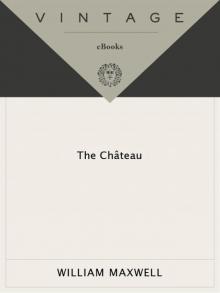 The Chateau
The Chateau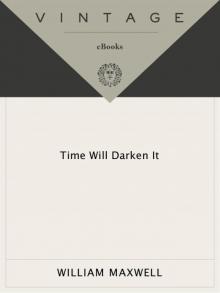 Time Will Darken It Time Will Darken It
Time Will Darken It Time Will Darken It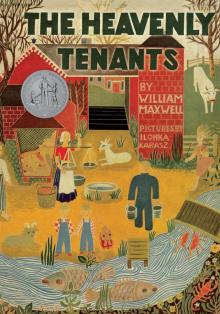 The Heavenly Tenants
The Heavenly Tenants They Came Like Swallows
They Came Like Swallows So Long, See You Tomorrow
So Long, See You Tomorrow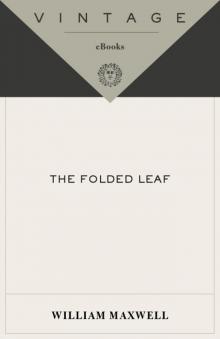 The Folded Leaf
The Folded Leaf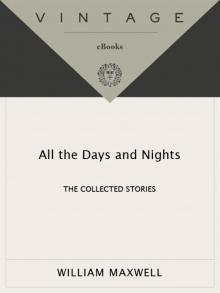 All the Days and Nights
All the Days and Nights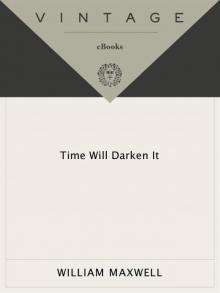 Time Will Darken It
Time Will Darken It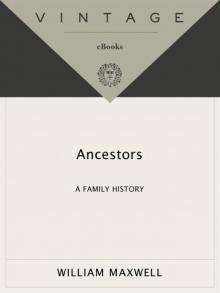 Ancestors
Ancestors